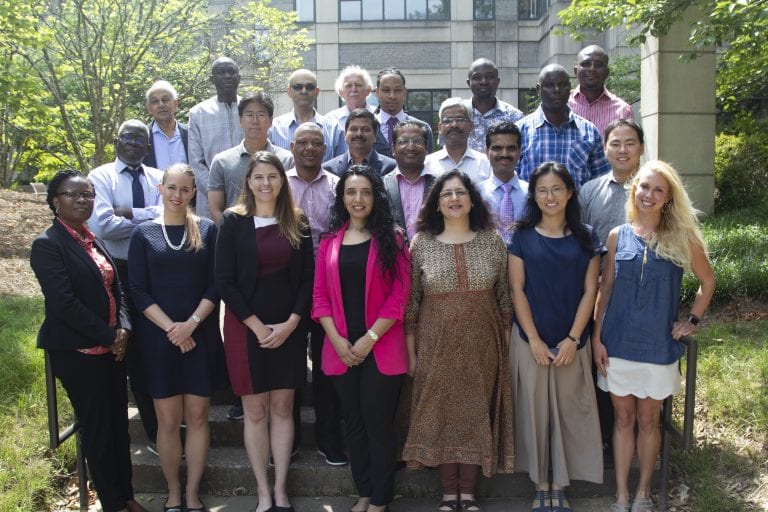Monitoring and Evaluation
Monitoring and Evaluation
July 4 - 15, 2022

Effective monitoring and evaluation of programs remains both a challenge and priority in developing and emerging economies. It is a key element for successful planning and implementation of development programs in sectors such as health, education, agriculture, rural and urban development, and municipal services. The two-week program on Monitoring and Evaluation of Development Programs (M&EDP) helps participants learn the key steps and analytical tools to design and monitor programs and develop an analytical framework to evaluate their performance and outcomes.
About the Program
The M&EDP program will cover the following topics
M&E Planning and Management
- Integrating planning, monitoring, and evaluation for results
- Identifying indicators and collecting data and resources
- Choosing and developing a framework applicable to development programs
- Identifying and involving stakeholders in joint processes
- Identifying and planning for M&E institutional architecture
- Human resources and capacity building for M&E
M&E Techniques and Processes
- Decentralized evaluations
- Employing cost benefit and cost effectiveness analysis
- Developing socio-economic performance indicators
- Innovative techniques for valuing public program outputs and outcomes
- Sector-specific analytical frameworks (e.g., health, education, agriculture, sanitation, rural and urban development, transportation, and municipal services)
- Using Excel to conduct and estimate the impact of real life programs
- Statistical theory and tools, sampling, distributions, randomized trials

DATES
Early bird Tuition - First Deadline: (25% Discount) February 27, 2023
Early Bird Tuition - Second Deadline: (10% Discount) April 28, 2023
Final Application & Tuition Deadline: June 5, 2023
Program: June 12 - 23, 2023
Classes take place from 9am - 1:30pm. All times are in EST
LOCATION
All classes will be held virtually using the Zoom video conference platform. Concerns regarding course connectivity should be directed to the DCID ExEd Team at dcidexed@duke.edu.
LEARN MORE
For questions, please contact the Executive Education staff at dcidexed@duke.edu
STAY CONNECTED
Interested in hearing more about similar courses on public financial management?

About the Faculty

Dr. Gangadhar P. Shukla is Professor of the Practice of Public Policy at DCID and Director of the Program on Tax Analysis and Revenue Forecasting (TARF).Previously, he was a lecturer and a Development Fellow at the Kennedy School of Government, Harvard University and an Associate at the Harvard Institute for International Development (HIID).While at Harvard, Shukla taught courses at the Kennedy School and in the Economic Department, directed the Program on Tax Analysis and Revenue Forecasting, and provided technical assistance to over a dozen countries in Africa, Asia, Latin America, and Transitional Economies on tax policy and project evaluation. He previously served the government of India for twenty years in a variety of local, state and central government executive positions – with considerable practical experience in local government finance, urban development, public sector management, financial management, budgeting, and revenue and expenditure analysis.Shukla has a Ph.D. in Political Economics and Government from Harvard University.
Throughout the program, Dr. Shukla invites guest lecturers from Duke University faculty and international experts and practitioners with wide experience in different aspects of designing, implementing and monitoring development programs.
‘‘The last two weeks have been a pleasure both personally and professionally. The program targeted the content to the participants, and also showed a good balance of theory and practice.”
Dominique Ambrose-Charles, participant 2017 M&EDP
Executive Education at Duke University

Established in 1851 as Normal College and then Trinity College, Duke University is one of America’s leading universities, offering undergraduate, master’s, and doctoral degrees across 12 schools and institutes.
Duke University has a long track record of excellence in education. In 2021, Duke’s undergraduate program was ranked 9th in the United States and 22nd in the world by US New & World Report. Duke’s student population includes 16,000 undergraduate and graduate students from all around the world. With access to the latest pedagogy and technology, Duke university’s faculty are expert teachers, inspiring generations of new thinkers who are ready to take on the world’s greatest challenges.
In addition to its world-class education opportunities, Duke faculty conduct cutting-edge research in the fields of engineering, computer science, biology, economics, law, public policy, and many more. On an annual basis, Duke spends more than $1 billion on research activities, making it one of the ten largest research universities in the United States. For their work in advancing science and knowledge, Duke faculty have received numerous awards and recognitions.
Duke’s alumni include leading minds from government, the private sector, and the non-profit world. Notable alumni in the world of technology and business include Apple CEO Tim Cook, Etsy CEO Chad Dickerson, and Microsoft CFO Amy Hood.
